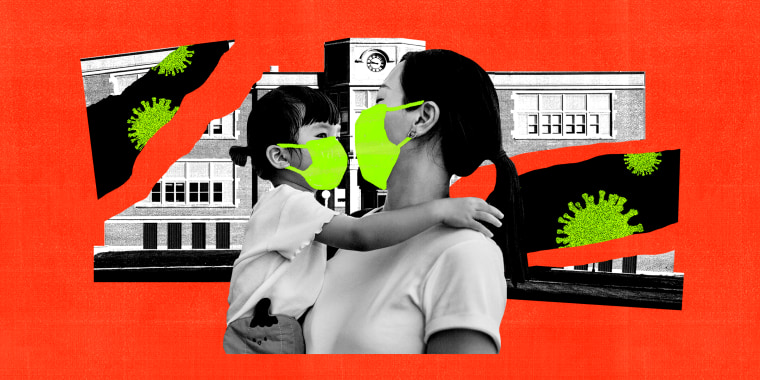As a surge in coronavirus cases coincides with the beginning of the school year, some parents are torn — eager for their kids to attend school in person, but worried about the risks of COVID-19, especially the new variants.
TODAY Parents talked to six infectious disease doctors who are also parents, and they shared their concerns for their own children as well as what they think will make it safe for kids to be in the classroom.
1. Dr. Jon Zelner, epidemiologist at the School of Public Health at the University of Michigan
Zelner said that he has two small children, aged 4 and 7, both of whom have done activities like preschool and summer camp since the start of the pandemic. Zelner said that rules around masking and distancing make it easier to feel comfortable.
"To me it boils down to masking."
"They follow stringent masking rules and outside they can take them off but my guys tend to keep them on unless they're super hot or eating or drinking," Zelner said. "... To me it boils down to masking and taking the opportunity to get out of poorly ventilated environments as much as possible."
2. Dr. Krystal Pollitt, assistant professor of epidemiology at the Yale School of Public Health
Pollitt, who lives in Connecticut where more than 60% of the population is fully vaccinated for COVID-19, said that knowing the "appropriate controls are in place" makes her feel better about sending her young, unvaccinated son back to school.
As an epidemiologist, she's talked to her son's school about protective measures like masking, breaking classes into cohorts, increasing ventilation and cleaning protocols.
"This definitely reassures me about his safety, as well as the (safety) of the entire school community," Pollitt said.
3. Dr. Ashley Lipps, infectious disease doctor at the Ohio State University Wexner Medical Center
Lipps said that she has been concerned about the increase in cases driven by the delta variant, but because there "hasn't been any indicator that the delta variant is causing more severe illness in children," she said, she still feels comfortable sending her child to school as long as appropriate measures are in place.
"We have a lot of experience from the last year about how to deal with COVID."
"I think we have a lot of experience from the last year about how to deal with COVID," Lipps said. "We just haven't really been dealing with this new contagious variant."
4. Dr. Bill Hanage, associate professor of epidemiology at the Harvard T.H. Chan School of Public Health
Hanage joked that his family was a "true infectious disease epidemiologist family" that had been closely following the pandemic since its start. He said the current resurgence of COVID-19 is "very, very hard" to deal with.
However, he does still intend to have his children learn in person.
"Regular testing, masks, ventilation, using outdoors."
"If you put in multiple mitigation strategies by which I mean regular testing, masks, ventilation, using outdoors, et cetera, then you can reduce the incidence in schools, and that's a good thing," Hanage said.
5. Dr. Diego Hijano, infectious disease doctor at St. Jude Children's Research Hospital
Hijano, who has one vaccinated child and one unvaccinated child, said that he and his wife have decided to "prioritize in-school learning," especially for their younger child.
"Most of the families are frustrated because we spent the whole year taking care of our kids individually, because we felt that this year was going to be better," Hijano said, adding that he was worried about some poorly ventilated schools and other enclosed environments. However, considering his family's personal risk, he decided that they will send their children to school, even his unvaccinated daughter.
"I will be very hesitant to proceed."
"I will be very hesitant to proceed this way. Here in Tennessee, vaccination rates are very low and masks will not be mandated in schools so it's a very challenging situation and we thought a lot about it," Hijano said. "... As frustrating as it is for me as a pediatrician and as a parent, it's kind of the reality we have to live in."
6. Dr. Jennifer Lighter, pediatric infectious disease specialist at NYU Langone Health
Lighter, a mom who has been open about her desire to return kids to in-person learning, said that she believed schools should be deemed "essential" and could operate safely this fall if appropriate mitigation measures are in place.
She also said that adults in a community should consider getting vaccinated for the good of children and others who may not be able to be vaccinated.
"We need to work together and see vaccines as something you could do not only for yourself but for your community," she said.
Related:



